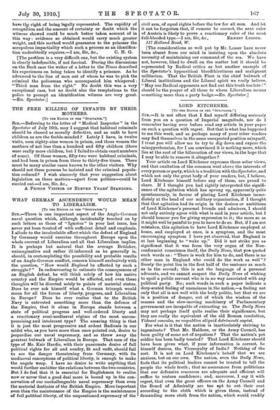WHAT GERMAN ASCENDENCY WOULD MEAN TO LIBERALISM.
[TO THE EDITOR OF THE " SPECTATOE." ]
SIR,—There is one- important aspect of the Anglo-German naval question which, although incidentally touched on by such letters as those of " Ignotus " in your last issue, has never yet been treated of with sufficient detail and emphasis. I allude to the incalculable effect which the defeat of England by Germany would exercise throughout Europe upon the whole current of Liberalism and all that Liberalism implies. It is perhaps but natural that the average Britisher, unimaginative and rather ill-informed as he generally is, should, in contemplating the possibility and probable results of an Anglo-German conflict, concern himself exclusively with the question, " How would England be affected by such a struggle ? " In endeavouring to estimate the consequences of an English defeat, he will think solely of how his native country and the Empire would be affected, and even these thoughts will be directed solely to points of material status. Does he ever ask himself what a German triumph would mean for all the forces of liberty, progress, and Liberalism in Europe? Does he ever realise that to the British Navy is entrusted something more than the defence of the Empire, that it alone in Europe stands between a state of political progress and well-ordered liberty and a reactionary semi-mediaeval regime of the most uncom- promising and intolerant type ? The amazing thing is that it is just the most progressive and ardent Radicals in our midst who, as you have more than once pointed out, desire to jeopardise our naval supremacy, and so throw away the greatest bulwark of Liberalism in Europe. That men of the type of Mt-. Keir Hardie, with their passionate desire of full political rights for all and sundry, fit and unfit, should fail to see the danger threatening from Germany, with its mediaeval conceptions of political liberty, is enough to make the angels weep. I have no desire to write anything that would further embitter the relations between the two countries. But I do feel that it is essential for Englishmen to realise now or never that a good deal more is bound up in the con- servation of our unchallengeable naval supremacy than even the material destinies of the British Empire. More important even than the maintenance of the Empire is the maintenance of full political liberty, of the unquestioned supremacy of the civil arm, of equal rights before the law for all men. And let it not be forgotten that, if rumour be correct, the next ruler of Austria is likely to prove a reactionary ruler of the most
full-blooded type.—I am, Sir, &c., ERNEST LESSER. 117 Holland Road, W.
[The considerations so well put by Mr. Lesser have never been absent from our mind in insisting upon the absolute necessity of maintaining our command of the sea. We have not, however, liked to dwell on the matter lest it should be represented by Radical critics as but another example of the Spectator's hypocritical bloodthirstiness and malignant militarism. Tbat the'British Fleet is the chief bulwark of Liberal institutions and the Liberal spirit we verily believe. " May our Radical opponents not find out this truth too late !" should be the prayer of all those to whom Liberalism means something more than a party badge.—ED. Spectator.]






































 Previous page
Previous page